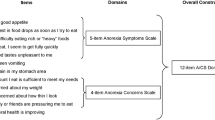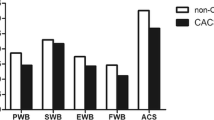Abstract
Purpose: The original Functional Assessment of Anorexia/Cachexia Therapy (FAACT) was designed to measure general aspects of quality of life (QOL) as well as specific anorexia/cachexia-related concerns. Our primary purpose was to reduce the number of anorexia/cachexia subscale items in a manner that either retains or improves reliability, validity and precision. Methods: The FAACT was administered using an interactive computer program that allowed immediate entry of the data. A total of 213 patients were recruited. Results: A combined empirical and conceptual approach led to the reduction of the anorexia/cachexia subscale (A/CS) from 18 to 12 items. A 26-item trial outcome index (TOI) combining physical well-being (PWB), functional well-being (FWB), and the A/CS-12 was highly reliable and sensitive to change in performance status rating (PSR). We found that PWB, FWB, and A/CS-12 subscales performed differently. Specifically, PWB and FWB scores decreased in patients whose (PSR) worsened. However, although A/CS-12 scores were responsive to change in PSR over time, average A/CS-12 scores of all patients, even those whose PSR worsened, improved over the course of treatment. Conclusions: Elimination of six items from the anorexia/cachexia subscale of the FAACT was accomplished without loss of internal consistency or sensitivity to change in performance status. The A/CS-12 subscale provides unique, important information not captured by a generic chronic illness questionnaire.
Similar content being viewed by others
References
Donoghue M, Nunnally C, Yasko JM. Nutritional Aspects of Cancer Care, Reston, VA: Reston Publishing Company, 1982.
Nelson KA. The cancer anorexia- cachexia syndrome. Seminars Oncol 2000; 27(1): 64–68.
Nelson K, Walsh D, Sheehan F. The cancer anorexia cachexia syndrome. J Clin Oncol 1994; 12: 213–225.
Donnelly S, Walsh D. The symptom of advanced cancer. Seminars Oncol 1995; 22 (Suppl. 3): 67–72.
Heber D, Tchekmedyian NS. Mechanisms of cancer cachexia. Contemp Oncol 1995; 3: 6–10.
(a) Watanabe S, Bruera E. Anorexia and cachexia, asthenia, and lethargy. Hematol Oncol Clin North Am 1996; 10(1): 189–206.7. (b) Cella D, Tulsky DS. Measuring quality of life today: Methodological aspects. Oncology 1990; 4(5): 29- 38.
Alexander HR, Norton JA. Pathophysiology of cancer cachexia. In: Doyle D, Hanks GWC, MacDonald N (eds), Oxford Texbook of Palliative Medicine, New York: Oxford University Press, 1994; 316–329.
Cella DF, Bonomi AE, Leslie WT, Von Roenn J, Tchekm-edyian NS. Quality of life and nutritional well-being: Measurement and relationship. Oncol Suppl 1993; 7: 105–111.
Cella DF, VonRoenn J, Lloyd S, Browder HP. The Bristol - Myers Anorexia/Cachexia Recovery Instrument (BACRI): A brief assessment of patients' subjective response to treatment for anorexia/cachexia. Qual Life Res 1995; 4: 221–231.
Tchekmedyian NS, Cella DF. Clinical usefulness of quality-of-life evaluations: The case of anorexia. Contemp Oncol 1995; 1: 30–33.
Cella DF, Tulsky DS, Gray G, et al. The functional as-sessment of cancer therapy scale: Development and validation of the general measure. J Clin Oncol 1993; 11: 570–579.
Cella D, Walter S, Norman G. Measuring change over time: Assesseing the usefulness of evaluative instruments. J Chronic Dis 1987; 40: 171–178.
Cella D, Bonomi AE. Measuring quality of life today: 1995 update. Oncology, November 1991 (Suppl.).
Cella DF. FACIT Manual: Manual of the Functional Assessment of Chronic Illness Therapy (FACIT) scales. Center on Outcomes Research and Education (CORE), Evanston: Northwestern Healthcare and Northwestern University, 1997.
Cella DF, Bonomi AE, Lloyd SR, et al. Reliability and validity of the Functional Assessment of Cancer Therapy - Lung (FACT-L) quality of life instrument. Lung Cancer 1995; 12: 199–220.
Brady MJ, Cella DF, Mo F, et al. Reliability and validity of the Functional Assessment of Cancer Therapy - Breast (FACT-B) quality of life instrument. J Clin Oncol 1997; 15: 974–986.
Ward WL, Hahn EA, Mo F, et al. Reliability and validity of the Functional Assessment of Cancer Therapy - Colorectal (FACT-C) quality of life instrument. Qual Life Res 1999; 8: 181–195.
Von Roenn JH, Armstrong D, Dickmeyer MS, et al. Me-gestrol acetate for the treatment of cachexia associated with human immunodeficiency virus (HIV) infection. Ann Intern Med 1994; 121: 393–399.
SAS System. Cary, NC: SAS Institute Inc. (Version 6.12).
Guyatt G, Walter S, Norman G. Measuring change over time: Assessing the usefulness of evaluative instruments. J Chronic Dis 1987; 40: 171–178.
Damiano AM, Patrick DL, Guzman GI, et al. Measurement of health-related quality of life in patients with amyotrophic lateral sclerosis in clinical trials of new therapies. Med Care 1999; 37(1): 15–26.
Calhoun EA, Fishman DA, Roland PY, Lurain JR, Chang C, Cella D, (in press). Validity and selective sensitivity of the FACT/GOG-Ntx' 36th ASCO Annual Meeting, 20- 23 May 2000, New Orleans, LA.
Author information
Authors and Affiliations
Rights and permissions
About this article
Cite this article
Ribaudo, J., Cella, D., Hahn, E. et al. Re-validation and Shortening of the Functional Assessmentof Anorexia/Cachexia Therapy (FAACT) Questionnaire. Qual Life Res 9, 1137–1146 (2000). https://doi.org/10.1023/A:1016670403148
Issue Date:
DOI: https://doi.org/10.1023/A:1016670403148




